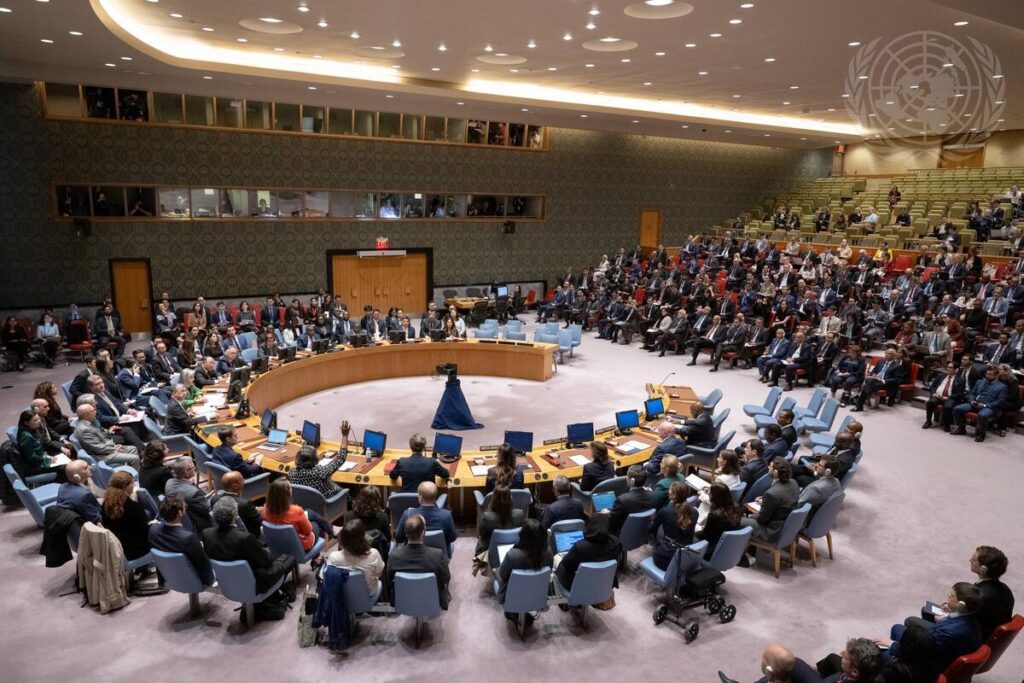New York, October 18 – The U.N. Envoy to the Middle East called for an inquiry into the destruction of a hospital in Gaza City that killed hundreds of people and he warned that the current Israeli-Hamas conflict is a “devastating and clearly difficult challenge” to the region and the world.
Tor Wennesland, the special coordinator for the Middle East Peace Process Emergency, told a U.N. Security Council meeting that the war is “one of the most difficult moments” for Israeli and Palestinian people in the past 75 years.
“The massacre and despicable acts of violence and terror perpetrated by Hamas against Israelis on 7 October are seared into our collective memory. There is no justification or excuse for such acts and I condemn them unequivocally,” he said. “We are facing a devastating and clearly difficult challenge for the region and for the international community. It comes at a moment when the global institutions we need to respond to such a crisis are already stretched.”
“Hundreds of Palestinians were killed – patients, health workers and those seeking shelter – when the al-Ahli Hospital in Gaza City was struck by lethal fire,” Wennesland said. “The circumstances and responsibility remain obscure and will need to be fully investigated, but the result speaks for itself.”
Israel-Gaza war creates an “utter catastrophe” in humanitarian situation – Fighting between Israel and Hamas militants in the Gaza Strip in the last 11 days has killed thousands of people and displaced over 1 million Palestinians in Gaza who cannot escape bombs and missiles, a U.N. official said, describing the humanitarian situation as an “utter catastrophe” as casualties and destruction are mounting.
Joyce Msuya, a U.N. assistant secretary-general for humanitarian affairs, said in a briefing that the death toll in the current conflict has already exceeded that of the 7-week conflict in 2014 between the two sides. More than 2,800 Palestinians have been killed, over 10,850 injured and hundreds are believed to be trapped under rubble.
Israeli authorities have confirmed that 1,300 Israelis have been killed and more than 4,100 injured while nearly 200 people are kidnapped by Hamas. Msuya said the captives must be “treated humanely; hostages must be released immediately.”
She said 15 staff of the U.N. relief organization in Gaza and five from the Red Cross and Red Crescent Movement have been killed and U.N. premises in Gaza are among those damaged by the war.
“As hostilities escalate, these numbers will only rise, and an already dire humanitarian situation will continue to deteriorate,” Msuya said. “It is now estimated that as many as 1 million people have fled their homes to other parts of Gaza. In reality civilians have nowhere to go—nowhere to escape the bombs and missiles, and nowhere to find water or food, or to escape the unfolding humanitarian catastrophe.”
“As civilians are packed into an ever-smaller area, the essentials they need to survive—shelter, water, food, power and medical care—have all but run out.”
Msuya said the U.N. will continue to engage with the fighting parties and governments with influence to find ways to bring and deliver humanitarian supplies in Gaza and allow U.N. and NGO personnel enter and exit the strip.
“We will continue to demand respect for international humanitarian law. Civilians and civilian infrastructure must be protected and humanitarian relief must be facilitated, as international humanitarian law demands. We urge all countries with influence to insist on respect for the rules of war and the avoidance of any further escalation and spillover,” she said.
The United States vetoed a U.N. Security Council resolution – A the council meetingon October 18,the U.S. vetoed a resolution that called for the delivery of humanitarian assistance to people in Gaza because it failed to recognize Israel’s right to self-defense even though 12 of the council’s 15 members voted in favor. Russia and the United Kingdom abstained.
The council’s voting rules call for nine countries to vote in favor to pass a resolution, provided there is no veto from any of the five permanent members – the U.S., Russia, United Kingdom, France and China.
U.S. Ambassador Linda Thomas-Greenfield said she cast the no vote because the resolution failed to “mention Israel’s right of self-defense. Israel has the inherent sight of self-defense as reflected in Article 51 of the UN Charter.”
But Thomas-Greenfield said the U.S., despite its veto, will continue to work closely with all council members on the crisis, “just as we will continue to reiterate the need to protect civilians, including members of the media, humanitarian workers, and UN officials.”
“Yes, resolutions are important, and yes, this Council must speak out. But the actions we take, must be informed by the facts on the ground and support direct diplomacy that can save lives,” she said.
The U.S. veto, which voided the resolution submitted by Brazil, came after the council rejected on October 16 a Russia-backed resolution on Israel-Gaza war, which called for a humanitarian ceasefire in Gaza, release of all hostages, aid access and safe evacuation of civilians. Only five countries – China, Gabon, Mozambique, Russia and the United Arab Emirates – voted in favor. Four countries – France, Japan, the United Kingdom and the United States – voted against and six abstained, they are Albania, Brazil, Ecuador, Ghana, Malta, and Switzerland. (By J. Tuyet Nguyen)
United Nations correspondent journalists – United Nations correspondent journalists – United Nations correspondent journalists – United Nations journalism articles – United Nations journalism articles – United Nations journalism articles – United Nations News – United Nations News – United Nations News

